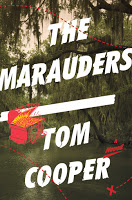In The Marauders, Tom Cooper’s first novel, setting is everything: the Louisiana bayous where a cast of outlandish characters make their living catching shrimp from Barataria Bay on the Gulf Coast of Louisiana.
The characters in the book must battle two catastrophic disasters to their homes and livelihoods: Hurricane Katrina and then the BP Deepwater Horizon oil spill.
 Tied to the land—or rather, to the water—by their small shrimp boats and their ramshackle homes, many of which have been devastated by the hurricane, they watch in dismay as the oil spill wrecks their livelihoods: they can hardly catch anything from the bay anymore, and even if they could, many restaurants are boycotting fish from the Gulf.
Tied to the land—or rather, to the water—by their small shrimp boats and their ramshackle homes, many of which have been devastated by the hurricane, they watch in dismay as the oil spill wrecks their livelihoods: they can hardly catch anything from the bay anymore, and even if they could, many restaurants are boycotting fish from the Gulf.
While the novel gives us a snapshot of a unique time and place, it also provides a portrait of a resilient culture that has withstood many shocks with hardiness, determination, suspicion of outsiders, and its own brand of zany humour. The book is filled with characters who are both pitiable and admirable but who always subvert expectations. Sometimes the characters who seem the least present and aware will turn out to be the sharpest observers with the best handle on a situation.
Through it all lurks the character Grimes, a former resident of the Barataria-turned-BP employee whose job is to give the residents a pittance of settlement money to ensure they don’t sue the company for damages later. Clearly from his very name, he is meant to be one of the antagonists, but we are also left with the impression that there are no real winners in such a disaster.
This is a book filled with crazy adventures, covering everything from alligators in bedrooms, a marijuana island, pirate treasure, and stolen prosthetic arms, to the many tragedies of Hurricane Katrina and the lasting effects of environmental damage from the BP oil spill. One of the most interesting scenes to me was when two of the characters are employed by a bird rescue society to wash the oil off of pelicans, which they do while covertly planning an elaborate heist for drugs. This mix of dark comedy with a background of sadness defines the book.
For similar fiction authors whose novels blend suspense with humour and a strong sense of place, try the works of Carl Hiaasen or Elmore Leonard.
 For more about the BP oil spill, check out Run to Failure: BP and the making of the Deepwater Horizon disaster by Abrahm Lustgarten. This non-fiction book chronicles a 20-year history at British Petroleum of poor management and cost-cutting measures that lead to the tragic Deepwater Horizon drilling rig explosion in 2010, which killed 11 people and caused millions of gallons of oil to be spilled into the Gulf of Mexico.
For more about the BP oil spill, check out Run to Failure: BP and the making of the Deepwater Horizon disaster by Abrahm Lustgarten. This non-fiction book chronicles a 20-year history at British Petroleum of poor management and cost-cutting measures that lead to the tragic Deepwater Horizon drilling rig explosion in 2010, which killed 11 people and caused millions of gallons of oil to be spilled into the Gulf of Mexico.
 For more about Hurricane Katrina, try Hurricane Katrina: the storm that changed America by the editors of Time Magazine, with an introduction by New Orleans native Wynton Marsalis. The magazine chronicles the greatest natural disaster to hit the United States with in-depth reporting, gripping pictures, and first-hand accounts of the hurricane and aftermath. The book also raises haunting questions such as why the hurricane formed in the first place, why New Orleans flooded, and why it took so long for the government to respond to the desperate request for aid.
For more about Hurricane Katrina, try Hurricane Katrina: the storm that changed America by the editors of Time Magazine, with an introduction by New Orleans native Wynton Marsalis. The magazine chronicles the greatest natural disaster to hit the United States with in-depth reporting, gripping pictures, and first-hand accounts of the hurricane and aftermath. The book also raises haunting questions such as why the hurricane formed in the first place, why New Orleans flooded, and why it took so long for the government to respond to the desperate request for aid.



